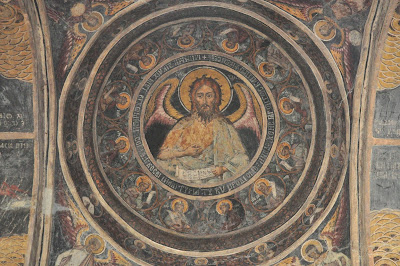- Stravopoleos Church Str. Stravopoleos no. 6, Old Town, Bucharest
 Finished in 1733, the Stravopoleos Convent, is considered ,,a work of supreme harmony" of the romanian renasance style (Brancovenesc style). Now, besides the church the convent has a museum and a cultural center, which can be visited. Monument protected by UNESCO.
Finished in 1733, the Stravopoleos Convent, is considered ,,a work of supreme harmony" of the romanian renasance style (Brancovenesc style). Now, besides the church the convent has a museum and a cultural center, which can be visited. Monument protected by UNESCO. Terminata in 1733, Manastirea Stravopoleos este considerata o lucrare de suprema armonie a stilului Brancovenesc. In zilele noastre, pe langa manastirea propiu zisa a fost construit un museu si un centrul cultural religios pentru orice fel de vizitatori. Acest monument este protejat de UNESCO.
- Cismigiu Garden / Gradina Cismigiu
In February 1845, the municipality bought the little lake formed by natural spring and
the surrounding pieces of ground also in order to realize a public garden. They assigned
the project to the architect G.Meyer. The final inauguration was in 1860. The Cismigiu
Garden became the most popular walking place in Bucharest. There, on the frozen lake,
was organized et the end of 19th century the first skating rink of the city also.

In februarie 1845, municipalitatea cumpara lacul format de un mic izvor impreuna cu
terenurile inconjuratoare (numite Balta Cismigiului) si incredinteaza arhitectului peisagist
G.Meyer realizarea unei gradini publice finalizata in etape si inaugurata in 1860, Gradina
Cismigiu va devenii cel mai popular loc de plimbare din Bucuresti. Tot aici, pe lacul
inghetat, a fost organizat la sfarsitul sec.19 primul patinoar al orasului.
- Atheneum Palace
for more information see the George Enescu Filarmonica web page
Construit între 1886 1888, parțial prin colectă publică,
Atheneul este sediul orchestrei filarmonice George Enescu. Stilul este
neo - clasic sala având o acustică perfectă.
pentru mai multe informații accesați siteul Filarmonicii George Enescu
- Apostu Zone in Kiseleff Park / Zona Apostu din parcul Kiseleff
Parcul Kiseleff este cea mai veche gradina publica a Bucurestilor din 1837. Aici dupa anul 2001 a fost creata o zona monumentala cu opere orginale in onoarea marelui sculptor roman George Apostu (1934-1986).
Ultimii sai ani din viata i-a trait la Paris, unde primaria orasului i-a oferit un atelier.
Este considerat unul din cei mai importanti sculptori ai secolului XX dupa Rodin si Brancusi.
His statues, in the form of an ensemble, represent the connection between Romanian people and the German Prince, but in the same time it glorifies the Romanian woman, she beeing the base of the family. His inspiration was Modura's and the Prince Carol's story.
The statues were destroyed by the communists, mainly because their principles - they considered the ensemble bourgeois and nationalist (a peasant girl couldn't have a connection of any kind with a prince). In 2008 the City Council rebuilt all of the statues after their initial plans.
read Modura's story in Facts & Stories
- Ion Jalea - ,,Hercules fighting against Centaurus" - Herastrau Park
Ion Jalea (1887-1983 ) was a very important romanian sculptor. One of his great masterpieces made from marble in 1925 is now placed in Herastrau Park, free to visit.
photos by Adriana Radulescu
for more information about I. Jalea look up http://en.wikipedia.org/wiki/Ion_Jalea
The 100 years of birth commemoration of King Carol I was in 1939.
The 100 years of birth commemoration of King Carol I was in 1939.
In the Old King's honor, Constantin Baraschi (1902 - 1966) had a more metaphorical vision than a conventional one.
His statues, in the form of an ensemble, represent the connection between Romanian people and the German Prince, but in the same time it glorifies the Romanian woman, she beeing the base of the family. His inspiration was Modura's and the Prince Carol's story.
The statues were destroyed by the communists, mainly because their principles - they considered the ensemble bourgeois and nationalist (a peasant girl couldn't have a connection of any kind with a prince). In 2008 the City Council rebuilt all of the statues after their initial plans.
read Modura's story in Facts & Stories
photos by Adriana Radulescu



















.JPG)




No comments:
Post a Comment